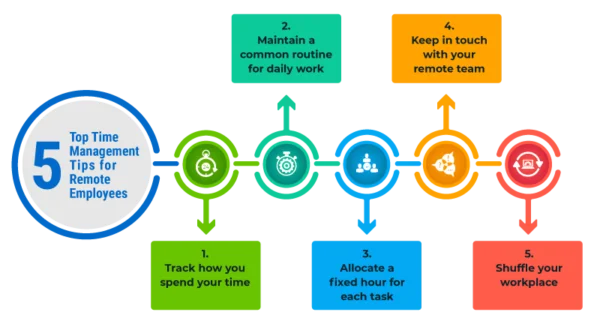What are the best strategies for effective time management as a remote worker?


Effective time management is crucial for remote workers to maintain productivity and achieve a healthy work-life balance. Without the structure and routine of a traditional office environment, remote workers must develop strategies to stay focused, manage their time efficiently, and avoid distractions. In this article, we will explore the best strategies for effective time management as a remote worker, including time tracking, time blocking, task prioritization, and maintaining work-life balance.
Time Tracking
One of the first steps to effective time management as a remote worker is to track your time. Time tracking allows you to understand how you are spending your time and identify areas where you can improve efficiency. There are several time tracking tools available that can help you monitor your work hours and track the time spent on different tasks. By analyzing your time logs, you can identify patterns, eliminate time-wasting activities, and allocate your time more effectively.
Time Blocking
Time blocking is a technique that involves scheduling specific blocks of time for different tasks or activities. This strategy helps remote workers stay focused and avoid multitasking, which can lead to decreased productivity. Start by identifying your most important tasks and allocate dedicated time blocks for them. During these time blocks, eliminate distractions and focus solely on the task at hand. By setting aside specific time for each task, you can ensure that important work gets done and avoid procrastination.
Task Prioritization
Prioritizing tasks is essential for effective time management. As a remote worker, you may have multiple projects or assignments to juggle. To prioritize effectively, start by creating a to-do list and categorize tasks based on their urgency and importance. Use techniques like the Eisenhower Matrix, which classifies tasks into four categories: urgent and important, important but not urgent, urgent but not important, and neither urgent nor important. By focusing on tasks that are both urgent and important, you can ensure that you are making progress on critical work.
Work-Life Balance
Maintaining a healthy work-life balance is crucial for remote workers to avoid burnout and maintain productivity. Without the physical separation of a traditional office, it can be challenging to establish boundaries between work and personal life. Here are some strategies to achieve a better work-life balance:
- Set clear boundaries: Establish specific working hours and communicate them to your colleagues and family members. This will help you create a routine and avoid overworking.
- Create a dedicated workspace: Designate a specific area in your home as your workspace. This will help you mentally separate work from personal life and minimize distractions.
- Take regular breaks: Schedule short breaks throughout the day to recharge and avoid burnout. Use this time to stretch, take a walk, or engage in activities that help you relax.
- Disconnect after work: Once your work hours are over, disconnect from work-related tasks and notifications. This will allow you to focus on personal activities and spend quality time with your loved ones.
Efficient Work Habits
In addition to the strategies mentioned above, developing efficient work habits can significantly improve time management as a remote worker. Here are some tips to enhance your efficiency:
- Eliminate distractions: Identify and eliminate distractions that hinder your productivity. This may include turning off notifications, closing unnecessary tabs or apps, and creating a quiet work environment.
- Batch similar tasks: Group similar tasks together and complete them in batches. For example, respond to emails in one dedicated time block instead of checking them throughout the day. This helps minimize context switching and improves focus.
- Delegate and outsource: If possible, delegate tasks that can be handled by others or consider outsourcing certain activities. This allows you to focus on high-value tasks and maximize your productivity.
- Practice effective communication: Clear and concise communication is essential for remote workers. Use tools like video conferencing, instant messaging, and project management software to collaborate effectively with your team.
In conclusion, effective time management is crucial for remote workers to maintain productivity and achieve a healthy work-life balance. By implementing strategies such as time tracking, time blocking, task prioritization, and maintaining work-life balance, remote workers can optimize their efficiency and make the most of their remote work experience. Remember, finding the right strategies that work for you may require some experimentation and adjustments.
Recent Posts
How do I create an engaging and informative online quiz or assessment?
Creating an engaging and informative online quiz or assessment can be a powerful tool for… Read More
What are the most effective methods for managing and reducing work-related stress in the hospitality industry?
Work-related stress is a common issue in the hospitality industry, where employees often face long… Read More
How can I improve my assertiveness and communication skills in a leadership position?
In a leadership position, assertiveness and effective communication skills are crucial for success. Being able… Read More
What are the key elements of a successful employee recognition and rewards program?
Employee recognition and rewards programs play a crucial role in motivating and engaging employees, as… Read More
How do I effectively manage and respond to customer feedback and reviews?
Customer feedback and online reviews play a crucial role in shaping a company's reputation and… Read More
What are the best strategies for effective time management as a stay-at-home parent?
Effective time management is crucial for stay-at-home parents who juggle multiple responsibilities on a daily… Read More